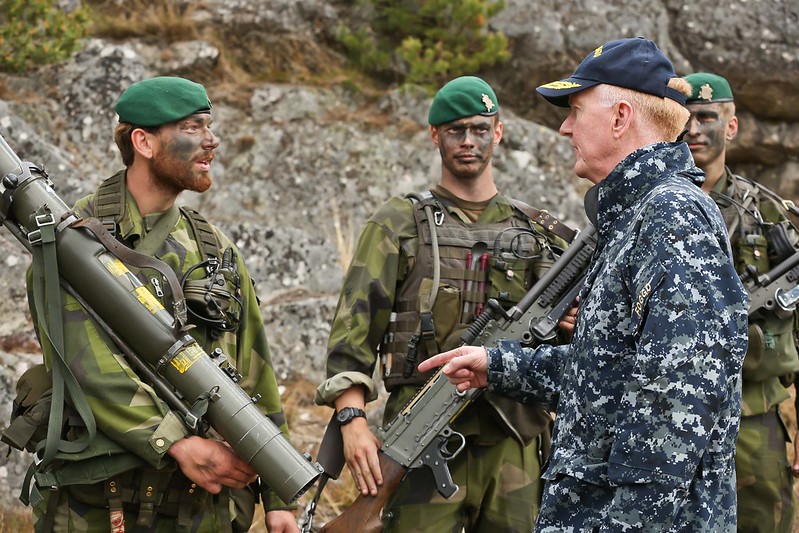
160612-N-PF515-009 UTO, Sweden (June 12, 2016) Vice Adm. James G. Foggo, III, commander Naval Striking and Support Forces NATO, commander, U.S. 6th Fleet, speaks with Swedish Marines from 1st Marine Regiment during the tactical exercise phase of BALTOPS 2016, June 12. BALTOPS is an annual recurring multinational exercise designed to improve interoperability, enhance flexibility, and demonstrate the resolve of allied and partner nations to defend the Baltic region. (U.S. Navy photo by Mass Communication Specialist 1st Class America A. Henry/ Released)
Sweden has a reputation as a neutral country, which hasn’t gone to war since 1814 and which preaches peace, but according to Trita Parsi in Foreign Policy, Sweden is now one of the alliance’s most confrontational members when it comes to China. Parsi writes:
NATO members breathed a sigh of relief as Turkish President Recep Tayyip Erdogan finally approved Sweden’s entry into the military alliance. To most NATO members, Sweden’s membership is a no-brainer: The peace-loving Swedes—the country has not been at war since 1814, has played a crucial role in the formation of the U.N. system, and has a well-earned reputation for peace-making and mediation—deserve to be defended by the alliance and will also be able to add to the security of NATO members with their modern and NATO-compatible military, the reasoning goes.
Yet the Sweden soon joining NATO is not the same country that once mediated conflicts in Africa, used its active diplomacy to reduce tensions between the two blocs during the Cold War, supported peaceful resolutions to armed conflicts, or championed disarmament and nuclear nonproliferation.
Russia’s invasion of Ukraine has not only shattered Sweden’s 200-year-old tradition of nonalignment, principled stance against selling weapons to warring nations, and staunch opposition to nuclear armament. (Sweden’s letter of intent to NATO from last year stated that “Sweden accepts NATO’s approach to security and defense, including the essential role of nuclear weapons”). Today’s Sweden views dialogue with Russia as appeasement and actively opposes diplomacy and compromise.
That, however, does not put Sweden outside of the current European consensus—despite being a complete departure from its deeply rooted values and long-standing foreign-policy tradition. Given Sweden’s historical conflicts with Russia, it is unsurprising and understandable that both Sweden and Europe have responded so strongly to Russia’s brutal and illegal invasion of Ukraine.
What is surprising is how hawkish and militarized Sweden’s perspective on China has become. On China, Sweden’s position and approach not only break with its own tradition, but Stockholm’s hawkishness also puts it outside the European consensus on China—and may help tilt NATO further toward confrontation with Beijing as the alliance’s mission slips eastward.
According to a new poll by the European Council on Foreign Relations of 11 European Union countries, Sweden has the most hawkish attitude toward China. Europeans, by and large, want to remain neutral in the U.S.-China geopolitical competition and are reluctant to “de-risk” from China. But on most questions, Sweden ranks among the most hawkish states. While 41 percent of Europeans favor sanctioning China if it supports Russia in its war in Ukraine, Swedes favor this approach to the tune of 56 percent.
Perhaps most importantly, while only 23 percent of Europeans favor joining the United States in a war with China over Taiwan and 62 percent prefer staying neutral, the numbers in Sweden are much higher: Thirty-five percent of Swedes favor supporting the US in a conflict with nuclear-armed China in this scenario—the highest level of support among surveyed European states.
These sharp views can’t be explained by any event in the Swedish-Chinese bilateral relationship. Rather, the shift in public opinion appears to be linked to the panic-stricken atmosphere in the country after Russia’s invasion of Ukraine and the rushed NATO application, around which very little debate was tolerated in public. The Swedish public discourse on security issues increasingly resembles the American debate around Iraq after the 9/11 attacks, where critical analysis that does not directly comply with the official Swedish stance or the dominant media narrative is treated with suspicion if not outright vilified. Moreover, in recent years, the public discourse has moved in an ideological direction in which the Biden administration’s narrative that the fault line of this century is a great “battle between democracy and autocracy” has been adopted hook, line, and sinker.
Read more here.
If you’re willing to fight for Main Street America, click here to sign up for the Richardcyoung.com free weekly email.





